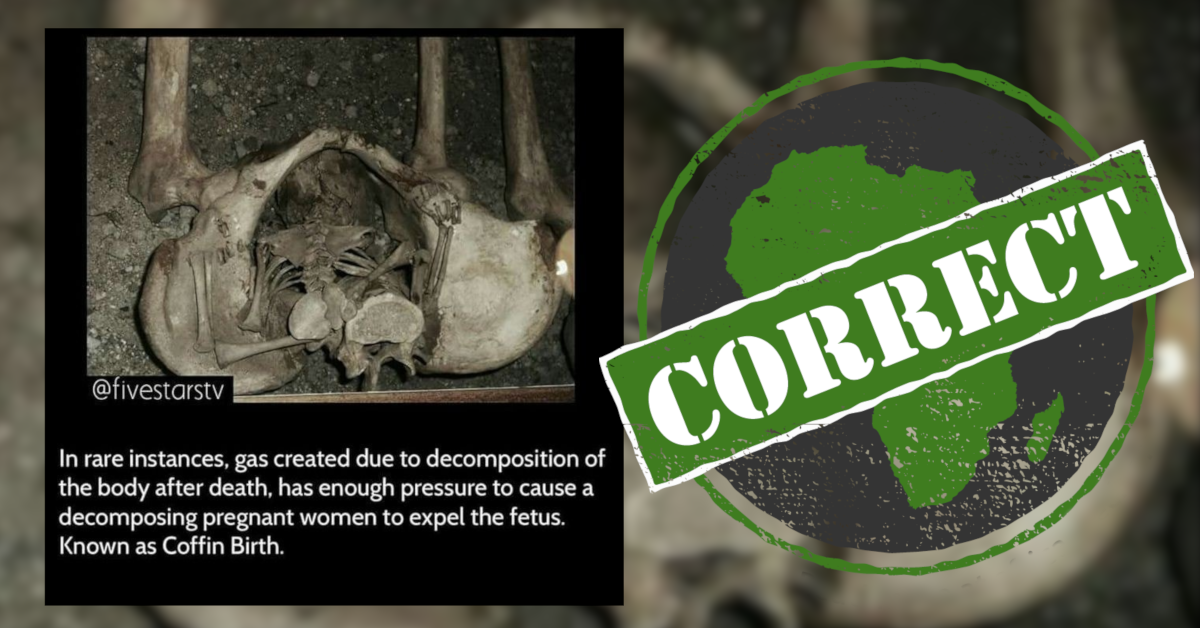A photo of a human pelvis bone with a small skeleton nestled within it is shown in a meme shared in South Africa. It was recently flagged by Facebook’s fact-checking system as possibly false.
“In rare instances,” the meme reads, “gas created due to decomposition of the body after death, has enough pressure to cause a decomposing pregnant woman to expel the fetus. Known as coffin birth.”
Could the gases of a decomposing woman’s body force her unborn child out of the womb after death?

A reverse image search found the photo on a number of webpages on the subject of coffin birth. None of them give its original source.
Coffin birth is an exceptional medical phenomenon. The scientific term for it is post mortem foetal extrusion.
In the process of decay, dead bodies create natural gases as they break down. This creates swelling.
When a pregnant woman dies the gases enclosed in the upper body and pelvic area can exert pressure on the uterus. This can slowly push the foetus out of the woman’s body.
There are a few historic medical records of coffin birth. But since they are historic, they are hard to verify.
A 2018 archaeological finding has sparked interest in coffin birth. Researchers from the Universities of Bologna and Ferrara published a study in the journal World Neurosurgery on a case from seventh or eighth century Italy.
The archaeologists found the skeletons of an adult woman and her unborn child “between the pelvis and the lower limbs of the adult”. The position of the foetal skeleton suggested to the study’s authors that it had been expelled from the mother’s body after death.
Caitlin M Doughty is a mortician, author and YouTube personality. In one of her videos she explains that coffin birth “can happen 48 to 72 hours after the death of a pregnant woman”.
But she also cautions that it is difficult, if not impossible, to prove it – particularly from archaeological finds. A child’s skeleton discovered below a woman’s skeleton does not automatically make it a case of coffin birth.
In 2005, a pregnant woman was found dead in Hamburg, Germany. When officials found her in her apartment, she was in an advanced state of decay.
During the subsequent autopsy, the foetus’s head and shoulders were found to be outside the woman’s vagina. This has officially been determined to be a coffin birth.
Coffin birth is possible, but rare. – Eileen Jahn
“In rare instances,” the meme reads, “gas created due to decomposition of the body after death, has enough pressure to cause a decomposing pregnant woman to expel the fetus. Known as coffin birth.”
Could the gases of a decomposing woman’s body force her unborn child out of the womb after death?

When mother and unborn child die
A reverse image search found the photo on a number of webpages on the subject of coffin birth. None of them give its original source.
Coffin birth is an exceptional medical phenomenon. The scientific term for it is post mortem foetal extrusion.
In the process of decay, dead bodies create natural gases as they break down. This creates swelling.
When a pregnant woman dies the gases enclosed in the upper body and pelvic area can exert pressure on the uterus. This can slowly push the foetus out of the woman’s body.
Archaeological finds
There are a few historic medical records of coffin birth. But since they are historic, they are hard to verify.
A 2018 archaeological finding has sparked interest in coffin birth. Researchers from the Universities of Bologna and Ferrara published a study in the journal World Neurosurgery on a case from seventh or eighth century Italy.
The archaeologists found the skeletons of an adult woman and her unborn child “between the pelvis and the lower limbs of the adult”. The position of the foetal skeleton suggested to the study’s authors that it had been expelled from the mother’s body after death.
Exceptional but possible
Caitlin M Doughty is a mortician, author and YouTube personality. In one of her videos she explains that coffin birth “can happen 48 to 72 hours after the death of a pregnant woman”.
But she also cautions that it is difficult, if not impossible, to prove it – particularly from archaeological finds. A child’s skeleton discovered below a woman’s skeleton does not automatically make it a case of coffin birth.
In 2005, a pregnant woman was found dead in Hamburg, Germany. When officials found her in her apartment, she was in an advanced state of decay.
During the subsequent autopsy, the foetus’s head and shoulders were found to be outside the woman’s vagina. This has officially been determined to be a coffin birth.
Coffin birth is possible, but rare. – Eileen Jahn
Republish our content for free
For publishers: what to do if your post is rated false
A fact-checker has rated your Facebook or Instagram post as “false”, “altered”, “partly false” or “missing context”. This could have serious consequences. What do you do?
Click on our guide for the steps you should follow.
Publishers guideAfrica Check teams up with Facebook
Africa Check is a partner in Meta's third-party fact-checking programme to help stop the spread of false information on social media.
The content we rate as “false” will be downgraded on Facebook and Instagram. This means fewer people will see it.
You can also help identify false information on Facebook. This guide explains how.


Add new comment